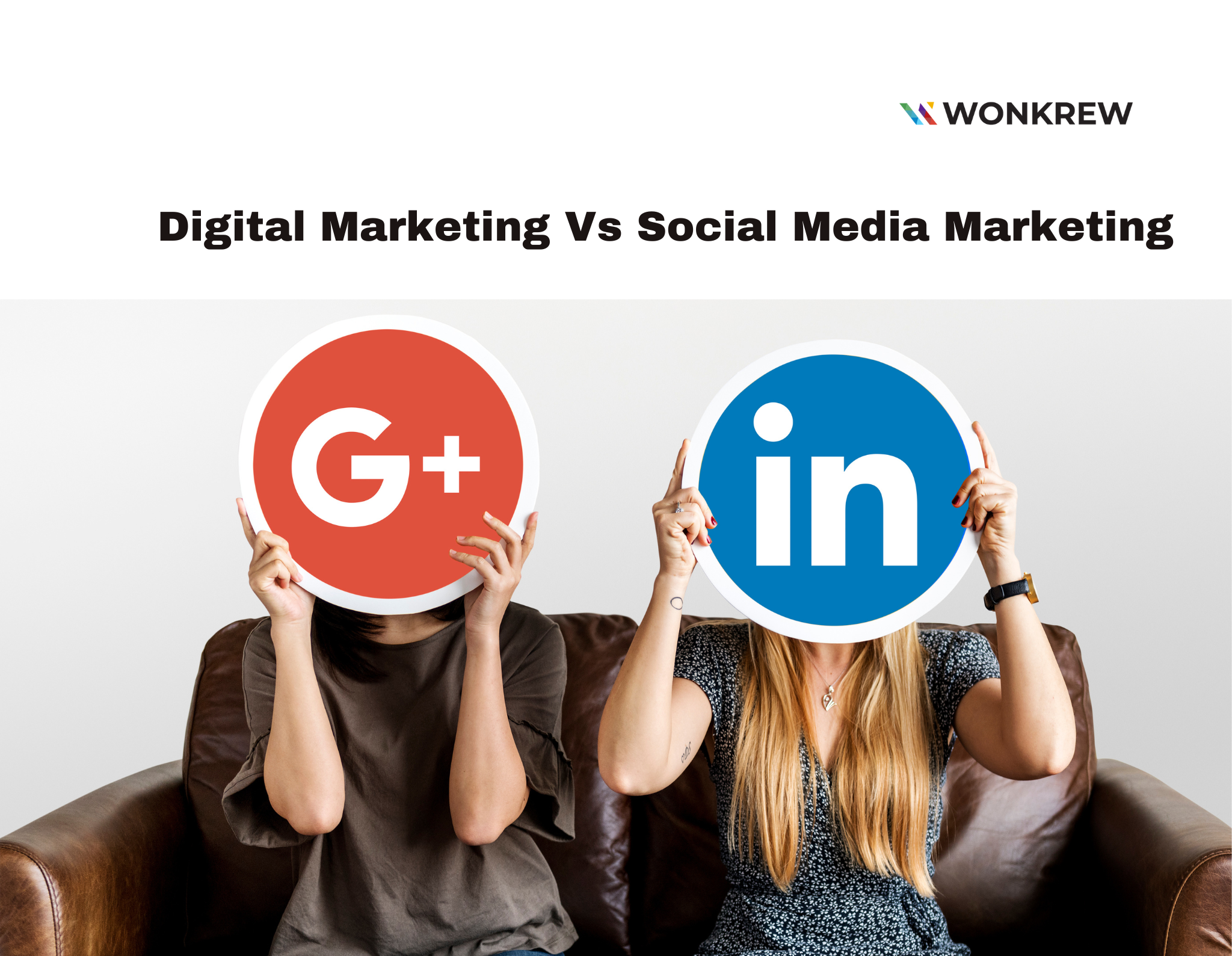Table of Contents
When it comes to marketing your business online, the terms “digital marketing” and “social media marketing” often pop up. While they are connected, they are not the same. Knowing the difference between Digital Marketing and Social Media Marketing is essential if you want to make the most of your marketing budget and strategies.
At Wonkrew, the best marketing and advertising agency in Chennai, we’ve seen how understanding these differences can make or break a campaign. Let’s break this down step-by-step, keeping it simple and relatable.
What is Digital Marketing?
Digital marketing is a broad term that covers all marketing efforts using digital channels. This includes:
- Search engines (like Google)
- Websites
- Mobile apps
- Online advertising platforms
It’s about using any digital tool to promote a product, service, or brand. For example, creating a digital marketing post that targets your audience on multiple channels is part of a digital strategy. Whether you’re running PPC ads, writing blogs, or sending email campaigns, it all falls under digital marketing.
What is Social Media Marketing?
Social media marketing (SMM) is a part of digital marketing that focuses on promoting content and ads on social media platforms like Facebook, Instagram, LinkedIn, and Twitter. It’s about creating content tailored to these platforms and engaging directly with your audience.
When you think about advertising social media marketing, imagine creating a catchy Instagram reel or a LinkedIn post that speaks to your audience. It’s interactive and, when done well, builds strong relationships.
7 Key Differences Between Digital Marketing and Social Media Marketing
Now that you know what each term means, let’s dive into their differences.
1. Scope of Work
- Digital marketing includes all online channels, including search engines, websites, and email.
- Social media marketing is limited to social platforms.
For instance, an eCommerce business might use SEO (search engine optimisation) for visibility and Instagram for promotions. These are parts of a larger digital and SMM plan.
2. Channel Variety
Digital marketing gives you options beyond social media. Think about:
- Running ads on Google
- Sending newsletters
- Optimising a website
Social media focuses only on platforms like Facebook or TikTok. So, if you’re asking, “What is SMM in digital marketing?”—it’s just one piece of the puzzle.

3. Audience Reach
With digital marketing, you can target users across the web—even on niche platforms. Social media marketing relies on the users of specific platforms. If your audience doesn’t use Twitter, your marketing there may not work.
4. Engagement Styles
- Digital marketing is often one-way (e.g., blog posts or email newsletters).
- Social media marketing is more conversational. You can reply to comments, start discussions, and engage in real-time.
5. Cost Structures
Digital marketing campaigns can range from low-cost SEO to high-budget PPC ads. Social media ads are often cheaper but might have a lower ROI depending on the platform and audience.
6. Metrics and Analytics
- Digital marketing uses tools like Google Analytics to measure performance across channels.
- Social media marketing relies on in-platform insights (like Instagram Analytics) to track reach, engagement, and conversions.
7. Time Frame
Digital marketing strategies often have long-term goals, like building a website’s authority. Social media marketing focuses on quick interactions and immediate engagement.
Quick Comparison Table Between Digital Marketing and SMM
| Aspect | Digital Marketing | Social Media Marketing |
| Scope | Broad (includes all online channels) | Narrow (limited to social platforms) |
| Channels | Websites, search engines, email, ads | Facebook, Instagram, LinkedIn, etc. |
| Audience Reach | Web-wide | Platform-specific |
| Engagement | Mostly one-way | Two-way and interactive |
| Costs | Varies (low-cost to high-budget) | Generally more affordable |
| Analytics | Tools like Google Analytics | In-platform insights |
| Time Frame | Long-term focus | Short-term focus |
Why Understanding the Difference Matters
If you’re a small business owner or marketer, this clarity helps you allocate your budget wisely. For example:
- If you want fast engagement, focus on social media marketing.
- If you need sustainable growth, invest in digital marketing strategies like SEO and email campaigns.
How to Combine Digital and Social Media Marketing
To get the best results, you need both. Here’s how:
- Use Social Media for Brand Awareness: Share engaging content and ads on platforms where your audience spends time. Social media is ideal for humanising your brand.
- Leverage Digital Marketing for Conversions: Run PPC campaigns or use email marketing to target users who already know your brand. A well-crafted digital marketing post can drive them to your website to complete a purchase.
- Sync Strategies: Ensure your messaging is consistent. For example, if you’re promoting a sale, announce it on social media and back it up with email campaigns.

Digital Marketing vs Social Media Marketing: Which Is Right for You?
It depends on your goals. If you want broad visibility across multiple channels, go for digital marketing. If your focus is interaction and brand building, social media marketing should be your priority.
For example:
- A Chennai-based bakery might use social media to promote special offers but rely on digital marketing to rank higher on Google for “best cakes in Chennai.”
Final Thoughts
Understanding the difference between digital marketing and social media marketing helps you make smarter decisions. Both are valuable tools in your marketing arsenal, but their applications depend on your business needs.
If you’re unsure where to start, we at Wonkrew, the best marketing and advertising agency in Chennai, can guide you. With over 20 years of expertise, we specialise in crafting strategies that combine the power of digital and social media marketing to grow your business.
Ready to take your marketing to the next level? Contact Wonkrew today, and let’s get started!
FAQs
1. What is the difference between online marketing and digital marketing?
Online marketing includes all internet-based activities. Digital marketing also includes offline digital methods like digital billboards or SMS campaigns.
2. What is SMM in digital marketing?
SMM stands for social media marketing, which is a subset of digital marketing focused on platforms like Facebook, Instagram, and LinkedIn.
3. What is the difference between digital and social media marketing?
Digital marketing includes all online channels. Social media marketing focuses only on social platforms.
4. What are the similarities between social media marketing and digital marketing?
Both use digital channels to promote products, engage audiences, and track analytics for better performance.
5. What are the 5 pillars of social media marketing?
- Strategy
- Content Creation
- Engagement
- Analytics
- Advertising
6. What is SMO in digital marketing?
SMO optimises social profiles and content to increase visibility and engagement across platforms.




